Fostering Personnel and Personnel Policies
Recognizing that the source of our competitiveness is the power of our employees, we are working on human resource development as an important theme.
Human Capital Management Policy
The Nippon Steel Group’s basic philosophy is to “pursue world-leading technologies and manufacturing capabilities, and contribute to society by providing excellent products and services.” In addition, our management principles state, “We develop and bring out the best in our employees to make our Group rich with energy and enthusiasm.” In keeping with these principles, we have been working on human resource development as an important theme.
With the aim of continually evolving to become “the best steelmaker with world-leading capabilities,” we are also working to transform our business structure into a robust one that is not affected by the external environment, in addition to implementing the measures in the four pillars of our Medium-to Long-term Management Plan. In order to steadily implement these measures, we are investing in human resources, getting the most potential out of our employees, and promoting various measures to further improve productivity and ability.
Basic Policy for Human Resource Development
A goal of HR development is to create employees who can understand and implement our Corporate Philosophy and our Employee Action Guidelines. With this in mind, each employee shares in taking the lead in HR development.
The Nippon Steel Group’s basic approach to HR development is for supervisors to mentor their subordinates, through daily dialogue on the job, transferring understanding and knowledge of criteria for judgment and of operational skills. In order for this mindset to be shared by all employees, the following Basic Policy for Human Resource Development has been adopted.
[Basic Policy for Human Resource Development]
- HR development is the job itself, and supervisors play an important role in HR development.
- OJT training is a basis of HR development and is complemented by off-the-job training.
- Supervisors share objectives and outcomes of HR development clearly with their subordinates.
- Each individual strives for continual personal improvement for further growth.
| Unit | FY20211 | FY2022 | FY2023 | |
|---|---|---|---|---|
| Number of training/ learning hours |
hours/year per employee [million hours/year] |
32 [0.90] |
28 [0.80] |
35 [0.99] |
1Includes the training/learning during operation with reduced production in FY2021
Development of management personnel
In order to develop management personnel who will be responsible for the future of the Group, we get to share policies and issues through dialogue with management and other means. In addition, we provide training according to the stage of their rank as candidates for management executives so that they can develop a broader perspective. Specifically, the program provides them with the opportunity to learn about corporate and organization management, business management skills (financial, business strategy), global management, etc.—contents which lead to strengthen the exchange and collaboration of personnel.

Personnel development of office staff and engineers
Following the organizational strategy based on the Corporate Philosophy and Management Policy, the Nippon Steel Group uses an HR Development PDCA for office staff and engineers to effectively implement and establish the development of human resources. A development plan is formulated for each person, and an annual detailed plan is a base for the OJT, which is aligned with the supervisor-subordinate dialogue based on the assignment commitment sheet. At the end of a fiscal year, they look back the status of development, which leads to formulation of the plan for the following year. By reviewing performance, personnel who can deliver a strategy for each organization are systematically developed.
We are also working continuously to enhance the OFF-JT which complements the OJT. Various training programs are aimed at acquiring the knowledge and skills required for each qualification and position. An employee’s period of time from joining the Company to becoming a manager is divided into three steps: “Discipline,” “Creation” and “Independence.” Work reporting sessions and training by rank are carried out at the milestones of the 2nd, 3rd, or 5th anniversaries of the start of employment.
In addition, selective training to improve the skills needed for work, and technical education programs to systematically learn the knowledge needed for our engineers are available. These can be taken based on individual development needs upon the supervisor-subordinate dialogue.
Each employee acquires the knowledge and skills required for each role and position and, in addition to rank-based training aimed at improving the abilities of employees as a whole, and selective training based on individual development needs, training measures that support the realization of management strategies are incorporated for promoting human resource development by incorporating.
[Development of human resources who support realizing management strategies]
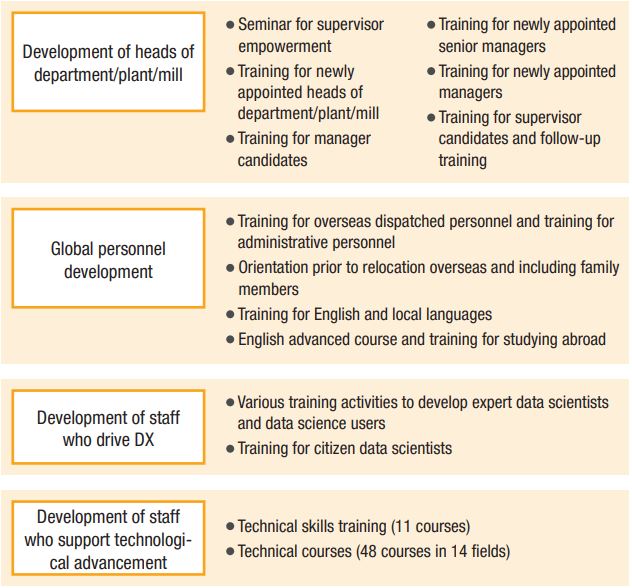
Development of heads of department/plant/mill
The training courses are provided to managers who match certain manager qualifications and position so that they can acquire a proper understanding of their responsibilities and authority as managers, acquire knowledge, skills, and mindset that contribute to enhancing management as supervisors, and acquire group management capabilities. In recent years, we have given increased attention to management education. For example, we incorporated a program on communication skills as managers and expanded a voluntary training course.
Global personnel development
For our employees to effectively work in any country where we are active, we provide pre-assignment training aimed for them to acquire basic knowledge to do business in the country and understand cultural differences. We have also set targets for English language skills to be reached at each level, and are working to raise the overall level of our group. For those whose job requires English skills, there is a program aimed at raising their proficiency level in English so that they can perform their jobs overseas without the need for translators or interpreters.
Further, to train future employees in our domestic and overseas businesses, we have incorporated, in the training courses by rank, a program for acquisition of the knowledge and skills necessary for business management.
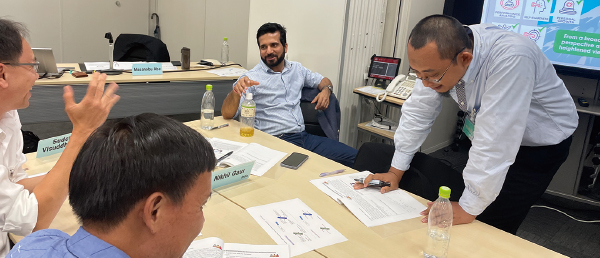
Concerning development of overseas local staff, we make efforts to transfer to an appropriate number the Nippon Steel Group’s operational skills, mainly through OJT, according to the Company’s Basic Policy for HR Development. In the ASEAN countries and India, where our overseas Group companies are concentrated, training courses by rank, as well as OFF-JT courses for specific skill learning and other subjects are conducted.
Development of staff who drive DX
We are developing human resources in both data science and digital management. As for data science education, our goal is to develop DX skills training to enable all office staff to become data science users “who can effectively use data” by 2030, and to grow at least 20% of our office staff and engineers into citizen data scientists “who can make advanced use of data.”
As for digital management education, we have been conducting training for all managers to understand their role in the promotion of DX and encourage them to change their mindset, so that they can facilitate operational process reform using digital technology. Through the education in these two aspects, we intend to accelerate our production and business process reform, using data and digital technology.
Development of staff who support technological advancement
In order to train our employees to achieve world-leading technologies and manufacturing capabilities, courses to learn the essential knowledge and technologies for steelmaking engineers are prepared. In particular, the content of courses classified as steelmaking process-specific technologies is at the core of Nippon Steel’s technology. We have developed an environment in which we can learn from basic technologies to advanced technologies, with excellent in-house engineers as instructors.
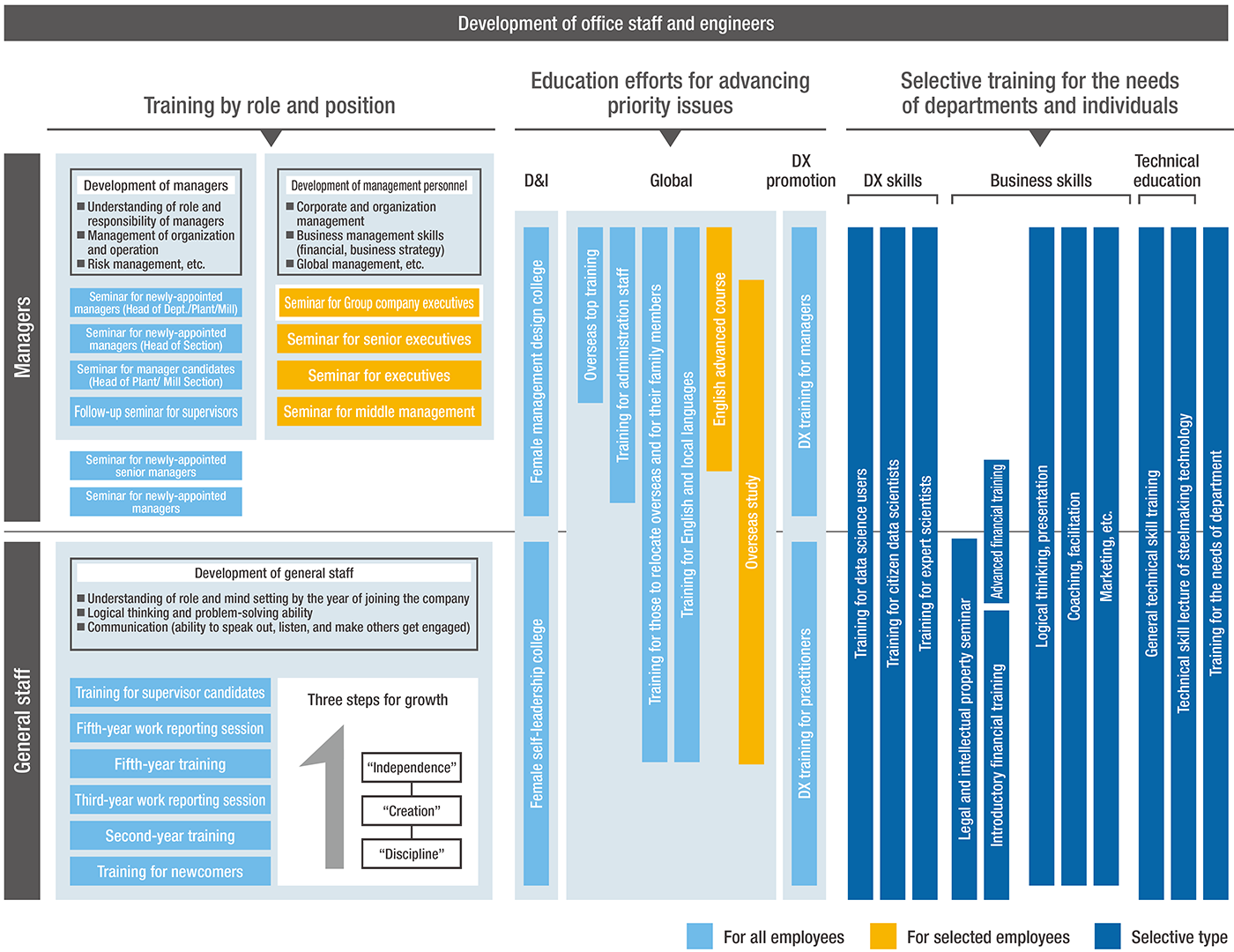
Personnel development of operators and maintenance staff
The operators and maintenance staff continuously build up their skills in steelmaking and maintenance, starting when joining the Company, on the assumption of continued long-term employment to retirement. Smooth transmission of technology and skills from veterans to younger workers is essential and a system that facilitates this is needed. Therefore, after identifying, through a supervisor-subordinate dialogue, the skill or skills to be acquired, a skill development plan is developed and carried out. Training is conducted mainly through On-the-Job Training (OJT), and the HR Development PDCA is kept up to date for use by repeatedly revising and implementing the development plan based on the progress of individuals.
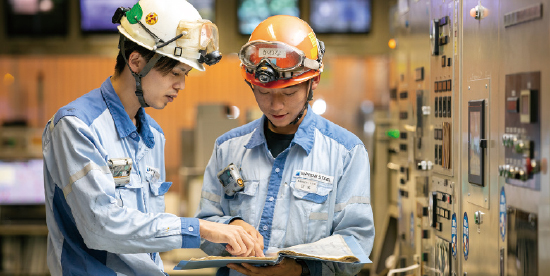
Off-the-job training (OFF-JT), which complements OJT, is used throughout the Company by organizing the minimum skills and knowledge required by each rank of employees of the Nippon Steel Group into a company-wide standard system. Through this, we work at education of workplace leaders to further increase their ability to add to and improve our knowledge base from the field (“field technology”) and at measures to maintain and improve motivation of older people to continue working with health and motivation.
We are also actively promoting cooperation in HR development with partner companies, which play an important role in our steelmaking, from the perspective of deepening and expanding our partnerships. Specifically, in addition to the training of each partner company, we also conduct training for the employees of our cooperative companies. Level-specific training to impart and improve knowledge and skills needed for partner companies’ employees in different ranks, such as newcomers, young staff, team leaders, job leaders, and line managers, is available, with Nippon Steel’s employees serving as instructors.
Through these efforts, we support the HR development of our partner companies, encourage exchanges between our on-site employees and their employees, and establish a foundation for smooth business execution.
Another area we focus on is to diversify recruitment sources (especially for female employees and mid-career recruitment), and we strive to create a workplace climate in which diverse personnel can be motivated and collaborate with each other through human rights awareness and harassment prevention.
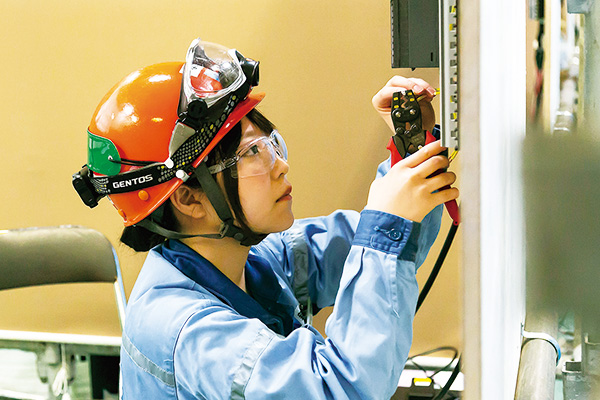
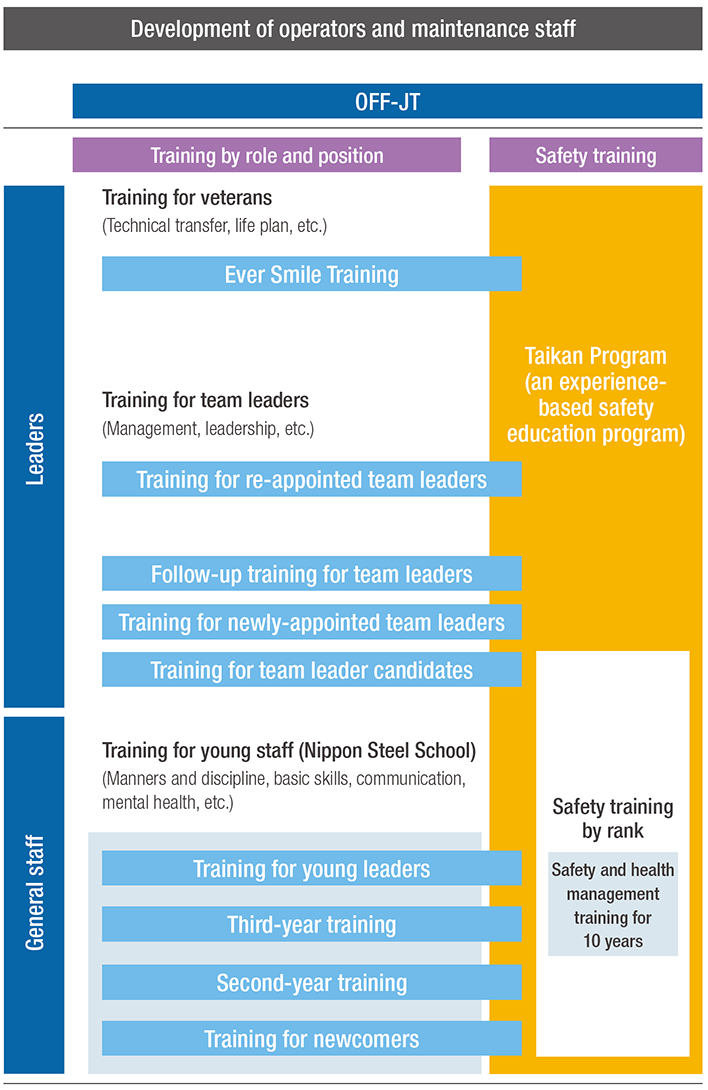
Note: In addition to the above, training to impart and improve knowledge and skills needed for partner companies' employees by rank (newcomers, young staff, team leaders, job leaders, and line managers) with Nippon Steel's employees as instructors is available.
Personnel treatment system
Nippon Steel’s administering of personnel policies aim at encouraging our employees to grow and develop their overall capabilities, from the time they join the company until they retire. We also find it important to ensure consistent, fair treatment of all employees regarding their capability and achievement, by methods including through dialogue between supervisors and subordinates.
